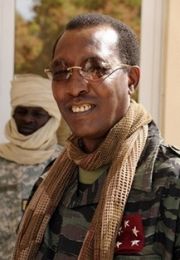French prop for Deby may backfire in Chad conflict
February 8, 2008 (DAKAR) — France’s rush to prop up Chad’s president compromises the neutrality of a European peacekeeping force bound for the central African state and appears to offer no lasting political solutions to the civil war there.

Backed by French warplanes and troops offering logistics, intelligence and protection, the Chadian leader, himself an ex-rebel dubbed the “cowboy of the sands” by his former French instructors, beat back the latest rebel assault a week ago.
Battered but reported to be regrouping in the centre of the former French colony, the rebels have vowed to fight on, a warning they also directed against “neocolonialist” France.
Chad accuses its eastern neighbour Sudan of arming and backing the insurgents, a charged denied by Khartoum.
De Waal and other analysts predicted that the rebel campaign to topple Deby would go on despite France’s announcement — sanctioned by United Nations Security Council support for the Chadian leader — that it could intervene more directly in Chad. “Deby is intrinsically unsustainable,” de Waal said.
French officials have said in the past they see no viable alternative to Deby among the squabbling rebel leaders.
There were concerns that the unequivocal French support for Deby voiced this week by President Nicolas Sarkozy and his ministers stripped any pretence of neutrality from a European Union peacekeeping force (EUFOR) due to deploy in eastern Chad.
France is providing half the troops of the 3,700-strong EU force, whose U.N. mandate foresees a strictly neutral mission to protect thousands of refugees and civilians from violence spilling over the border from Sudan’s war-torn Darfur region.
“EUFOR and the U.N. mission are deploying into the middle of an active civil war,” said International Crisis Group’s Horn of Africa project director David Mozersky, who also covers Chad.
“If the EU force deploys under these circumstances, with France as a belligerent, it can’t seriously be considered neutral,” said de Waal, who works at the U.S.-based Social Science Research Council.
LEGITIMACY QUESTIONS
Few doubt the rebels, and their patron Sudan, launched the attack on N’Djamena to pre-empt the EU deployment, which will increase surveillance of their Chad/Sudan border strongholds.
“Sudan clearly feels threatened by the European peacekeeping mission right at its doorstep, across the border from Darfur,” said Philippe de Pontet, an analyst with the Eurasia Group.
EU commanders postponed the main deployment operation, but say it could take place next week. European diplomats report misgivings among some EU states about France’s single-minded support for Deby, whose legitimacy many question.
Opponents accuse the Chadian leader, who seized power in a 1990 eastern revolt and has enjoyed French patronage since then, of ruling like a corrupt dictator, squandering Chad’s new-found oil resources and favouring his family and Zaghawa ethnic clan.
He won elections in 1996, 2001 and 2006, but the 2006 polls were boycotted as rigged by the main opposition and only a trickle of voters cast their ballots.
Mozersky and de Waal said they were surprised to hear Sarkozy and his ministers endorsing Deby’s “democratic” credentials so wholeheartedly.
“There is still no one talking about the governance issue in Chad … it’s astonishing that people are not asking lots of questions about the deeper issues,” Mozersky said.
Amnesty International and other rights groups have demanded that Deby’s government reveal the whereabouts of opposition figures they said were dragged from their homes by security forces during the weekend fighting. Amnesty said they were at risk of being “tortured or forcibly disappeared”.
De Waal said he was astonished that France was not openly using its diplomatic and military leverage over Deby to push him to open a political dialogue with his foes.
Rebel leaders say they are willing to accept a ceasefire and all-inclusive dialogue, but the government has rejected talks with “mercenaries”.
Despite the U.N. Security Council mantle for Deby, de Waal saw France’s latest moves in Chad as harking back to its old “Francafrique” policy, where Paris regularly intervened in French-speaking Africa to prop up leaders of its choice.
“Francafrique was looking pretty sick, but it’s been given an injection of testosterone, it’s alive and kicking,” he said.
(Reuters)
